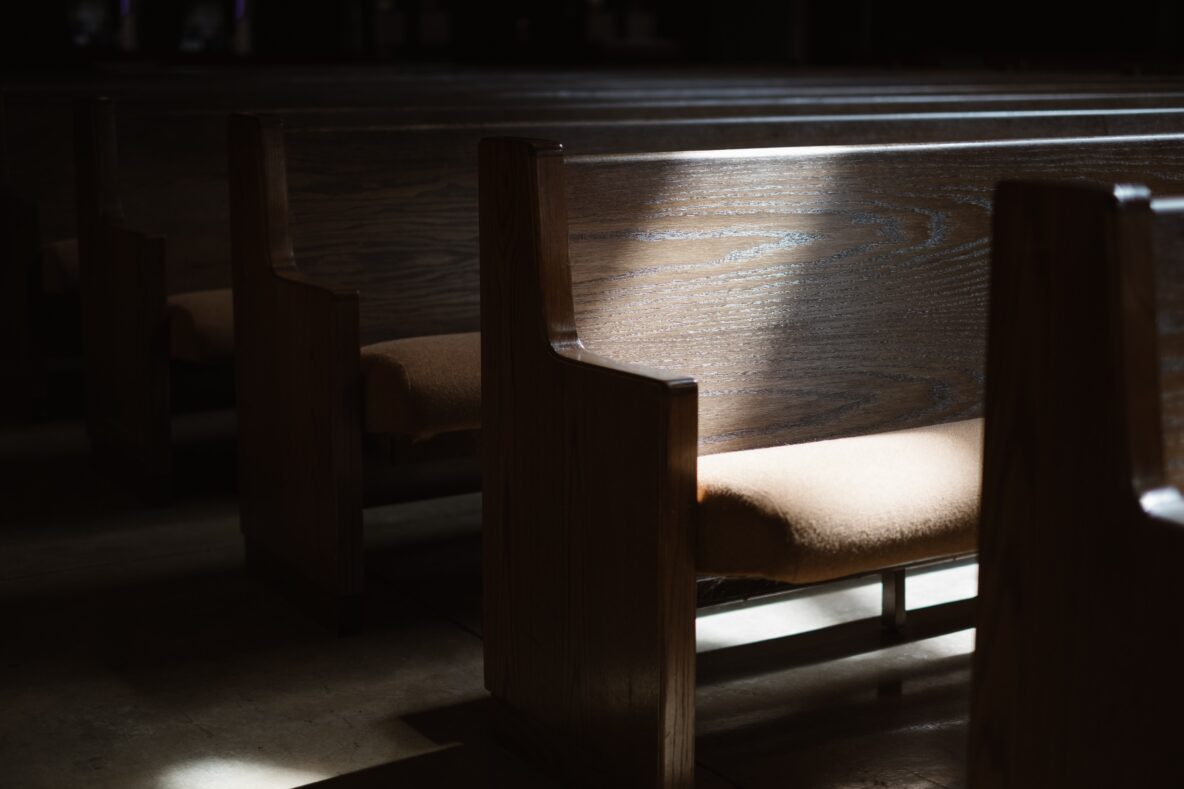“I was dating a girl from a cross-town school, and she got pregnant. Her parents were not going to be happy that she was pregnant at 17 years old. I demanded that she get an abortion.”
Suffering from years of guilt, Tyler faced consequences from “one of those deep sins you lock in the basement and say I will knowingly die with this sin.”
Tyler is executive pastor of Veneration Church in Kalispell, Montana. Not until he came to faith in Christ did the pain of his secret sin become unbearable. He knew he had to confess it to Alicia, his wife, the mother of their three children.
The couple agreed that he should contact his former girlfriend and apologize. The gesture would also provide remedy for the growing conviction Tyler had years earlier when he proposed marriage to Alicia.
On a speakerphone conversation with his ex-girlfriend, and with Alicia by his side, Tyler apologized. They discovered the woman had become a Christian. “She was so happy that I’m a pastor and doing the things God called me to do,” Tyler said.
The couple’s testimonies shared via video lent humanity and spirituality to a sermon on abortion as part of a fall series on challenging cultural issues.
“Culture Clash: a biblical look at culture’s hottest topics” presented and explored several hotly debated, sometimes celebrated, and culturally condoned topics like licentious heterosexuality, homosexuality, transgenderism, and abortion.

Veneration’s senior pastor Luke Taylor preached the sermons at the church he planted four years ago in one of America’s fastest growing counties. To date, about 700 people attend the church that meets in a Christian school.
“At the core of all of these topics is an identity issue,” Taylor said. “There is an identity issue in people trying to find their fulfillment and satisfaction in someone or some thing other than Jesus.”
Taylor said his goal for the series was that people would find the fullness of life. The series is not a political war cry nor about protestors with picket signs. “This is a plea for people to find life. And this is for those who have found life and know how to biblically and lovingly lead others to life.”
Warning about the upcoming content, Taylor advised parents to utilize children’s church during the 5-week sermon series exclusively for adults. Parents who chose to allow their adolescent children to hear the sermons thanked Taylor, saying the sermons opened the door of conversation about issues their children are already facing in their culture.
SEXUAL PURITY
One of Taylor’s sermons focused on sexual purity especially within the context of biblical marriage, citing premarital cohabitation, premarital sex, extramarital sex, and viewing porn as among numerous biblical prohibitions regarding sensuality.
“But why does the Bible speak so much about sexual purity?” He asked. Because only within God’s design is found “our full satisfaction, our complete enjoyment, and our greatest pleasure.”
For those who sorrow over previous sexual sins, Taylor said, “Guilt and shame are from the devil. But conviction comes from the Holy Spirit.” The power of the Gospel redeems and frees us from the prison of past failures regardless of what they were, he said.
Following the sermon, Taylor’s invitation calling all who wanted to repent of sin and to commit to a life of purity garnered about 90 men who walked the aisle and stood up front in public testimony of their commitment.
FREEDOM FROM GUILT
One woman found freedom from decades of abortion guilt. She believed that her daughter — who was born without a right hand and died in her early thirties — was God’s judgment. She assessed the untimely death of her husband similarly.
In a subsequent discipleship group the walls fell. The group leader reported to Taylor: “The woman let go of 40 years of guilt and pain. We had an incredible time of prayer over her, where she was able to grieve her baby, give up to God the falsehoods Satan had over her, and start her restoration of moving forward without guilt.”
Taylor did not announce the sermon schedule because he didn’t want people to choose which sermons they might avoid. However, he accidentally mentioned when he would preach on abortion. “Driving home after church, I felt the Spirit of God telling me to switch the weekends for this topic because there might be women who would skip that sermon due to the grips of guilt and shame.”
Sure enough, Taylor heard that some women planned to miss that sermon. “If God was going to set them free, they needed to be there,” he said. So Taylor changed plans. The result was that “many women showed up the following weekend and were set free. God did God things in God ways,” Taylor said.
A PROBLEM OF IDENTITY
Hated by his father, one man struggled with confusing the relationship between his biological father and heavenly Father. Continuing his search for a church that would meet his spiritual needs, the man heard about God’s forgiveness at Veneration. “He was overcome by this message,” said his sister in an email to Taylor.
Beginning in the Garden of Eden, rebellion begat brokenness and both are at the core of every kind of identity issue in the culture, Taylor said, noting that everyone at some level has experienced brokenness or is dealing with it. “The devil will use your brokenness from the past to try and shape your identity for the future.”
The pattern of rebellion, brokenness, and loss of identity typifies the LGBTQ community, Taylor said. All the perversions of sex, heterosexuals included, are rebellion against God. 1 Corinthians 6:9-11 cites a litany of apparently equivalent immoral behaviors “but such were some of you,” he emphasized.
Brokenness reveals a sick soul that needs a healer, a broken heart that needs a surgeon, and a dying person that needs a Savior, Taylor noted. The beauty of the Gospel provides an escape from the lies of the past and into identity in Jesus.
“There is a difference between the one who is fighting these tendencies and the one who fully gives in to them,” Taylor said. “There is no habitual behavior that still defines you because Jesus changes that. Your new self doesn’t really recognize your old self.”
Quoting from the Psalms, Taylor said, “The Lord is near to the brokenhearted and saves those who are crushed in spirit” and “He heals the brokenhearted and binds up their wounds, (37:18;147:3).
“The Gospel works for only broken people. This is great news,” Taylor said. “It means that everyone of us in this room can come to Jesus, the one who can heal, restore, redeem, and breathe into our identity so that we no longer believe the lies of the devil. We are no longer defined by past sin. We are now defined by our present Savior.”
There was only one reported negative reaction to Taylor’s appeal for cultural engagement through the civic duty of voting. He advised that Christians should support the platform that most closely conformed to the Judeo-Christian ethic.
One man “walked out and then sent an email about how I should have kept politics out of the sermon,” Taylor said. In response to the man, Taylor expressed his belief that “the pulpit is for the proclamation of the Word of God. The Word and Gospel ought to influence politics; but politics should not influence the pulpit or the Gospel. The man came back and is going to start serving in the church.”
Taylor said the content of the sermons found application in the lives of many members regarding personal matters not directly related to the sermons.
The series was “not about what we are standing against but about who we are standing for,” Taylor said. Drawing from biblical teachings, Taylor prayed for the sermons to be “presented in a way that if anyone had a problem with what I said it would be because they rebelled against God’s Word and not my opinion.”
“The stories of life change really are mind-boggling. God is setting people free through the truth of his word. The supernatural Word of God transcends and informs all cultures for all of time and it will not be shaken,” he said.

